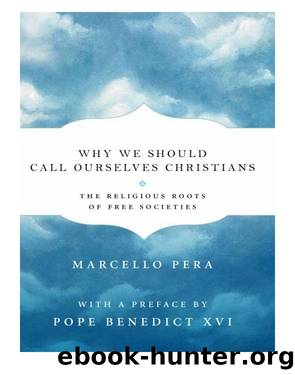Why We Should Call Ourselves Christians by Marcello Pera

Author:Marcello Pera
Language: eng
Format: epub
Publisher: Encounter Books
Published: 2011-08-16T00:00:00+00:00
CHAPTER THREE
Relativism, Fundamentalism, and the Question of Morals
âBETTERâ: ARE WE ALLOWED TO USE THAT WORD?
In the first chapter, we addressed the theoretical and political crisis of liberalism and concluded that it could be solved by attributing an ethical and specifically Christian basis to liberal doctrine. In the second chapter, we discussed the current stalemate in the process of European unification and the risks to social cohesion now endangering the West, concluding that in order to solve that crisis, Europe and the West need to recover their traditional Christian identity. Here one may ask: Well, why not abandon liberalism to its crisis and replace it with another political doctrine or regime? Why not leave Europe as it isâor why not try to unify it in some other way? Couldnât we live without liberalism, a united Europe, and a cohesive West?
My answer to the second question is: of course we could. Perhaps Europeâs future wouldnât be a rosy one, but it could keep on just as it is. Many people think so and are only trying to get by as best they can, some with conviction, others merely resigned.
The question regarding liberalism cuts deeper. The liberal doctrine continues to shape Western states, economies, and societies. The main ideas of liberalismâbasic rights, the separation of powers, a distinction between the state and civil society, the separation of church and state, the market economyâhave established themselves in many countries and provide the basis for Western lifestyles. Granted, there is no conclusive argument proving that liberal regimes are âthe end of historyâ or a necessary goal. Nor has it been proved that globalization is equivalent to Westernization. It is a fact, however, that liberal regimes are continually expanding, that they attract many people, and that they keep making great progress in terms of guarantees, opportunities, growth, and well-being. Thus when asked âCould we live without liberalism?â we are puzzled, because it is almost like being asked if we could live without the free market, science, technology, or democracy. It is hard to imagine what other system could replace liberal regimes to our equal satisfaction, because the conviction is ingrained in us that they are better than any other regime in existence or even imaginable.
Did I say better?
Here we jump from a problem into a trap. The problem is that judgments such as âX is better than Yâ are difficult to make with reference to lifestyles, cultures, traditions, or civilizations. The trap is the notion that we shouldnât even try to make them. The trap is decidedly odd because it applies selectively according to the situation. For example: No one complains if we say that the European way of life is better than the American one, or vice versa. Millions of men and women on both sides of the Atlantic are busy formulating such judgments day in and day out. A vast specialized literature exists on the subject, churned out continually by economists, jurists, sociologists, and other academics.
However, no one is allowed to say that the
Download
This site does not store any files on its server. We only index and link to content provided by other sites. Please contact the content providers to delete copyright contents if any and email us, we'll remove relevant links or contents immediately.
| Buddhism | Christianity |
| Ethnic & Tribal | General |
| Hinduism | Islam |
| Judaism | New Age, Mythology & Occult |
| Religion, Politics & State |
Cecilia; Or, Memoirs of an Heiress — Volume 1 by Fanny Burney(31341)
Cecilia; Or, Memoirs of an Heiress — Volume 3 by Fanny Burney(30938)
Cecilia; Or, Memoirs of an Heiress — Volume 2 by Fanny Burney(30894)
The Secret History by Donna Tartt(16643)
Sapiens: A Brief History of Humankind by Yuval Noah Harari(13067)
Leonardo da Vinci by Walter Isaacson(11912)
The Radium Girls by Kate Moore(10914)
Sapiens by Yuval Noah Harari(4546)
The Wind in My Hair by Masih Alinejad(4427)
How Democracies Die by Steven Levitsky & Daniel Ziblatt(4407)
Homo Deus: A Brief History of Tomorrow by Yuval Noah Harari(4287)
Endurance: Shackleton's Incredible Voyage by Alfred Lansing(3851)
The Silk Roads by Peter Frankopan(3769)
Man's Search for Meaning by Viktor Frankl(3644)
Millionaire: The Philanderer, Gambler, and Duelist Who Invented Modern Finance by Janet Gleeson(3573)
The Rape of Nanking by Iris Chang(3520)
Hitler in Los Angeles by Steven J. Ross(3442)
The Motorcycle Diaries by Ernesto Che Guevara(3340)
Joan of Arc by Mary Gordon(3262)
